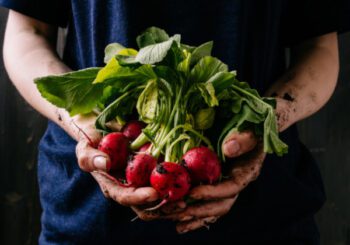By Jane Marsh
Guest Writer for Wake Up World
These days, organic food is all the rage. A quick visit to any grocery store reveals just how popular it has become, with “certified organic” labels printed on everything from cereal to coffee. Though some people are skeptical of the concept, organic food really is better for you and the planet. Here’s why.
[pro_ad_display_adzone id=”110028″]
1. No Toxic Chemicals
One of the main draws of organic food is that it doesn’t contain synthetic pesticides or herbicides. Conventional farming relies on the use of chemicals to ward off insects and rodents that would otherwise eat the crops. However, trace amounts of these chemicals can end up on the consumer’s plate, potentially leading to a wide range of health effects.
Pesticide residue has no apparent immediate effects. But it can build up in the body over time – a process known as bioaccumulation – and may cause problems later in life. And in countries with lax pesticide regulations, fruits and vegetables can end up directly poisoning consumers.
It’s important to note that some pesticides are perfectly natural. For example, a potent rat poison known as cholecalciferol goes by another name when it’s found in your food: Vitamin D3. In fact, it’s an essential nutrient in the human diet. Therefore, organic farmers can still use pesticides, but not those that cause health problems. You won’t find Roundup in your organic tomatoes.
2. Fewer Additives
Artificial colors, flavors, and preservatives have no place in organic foods. Organic foods can still contain harmless additives like baking soda in bread and enzymes in yogurt, but they won’t be soaked in food coloring, injected with flavors concocted in a lab, or contain unnatural preservatives.
Of course, organic food often has a shorter shelf life than foods made with preservatives. Bread doesn’t naturally last for weeks in the pantry without spoiling. But that’s a small price to pay for a more eco-friendly diet.
3. Potentially Better Nutrition
The jury is still out on whether organic foods have more vitamins and minerals than conventionally grown foods. That’s because there are so many organic foods to examine – eggs, meat, milk, fruits, and vegetables, to name a few – grown under so many conditions in different countries that it’s virtually impossible to make a blanket statement about their nutritional value. Plus, there are so many nutrients to examine!
What scientists have discovered is this: Soil quality greatly affects the nutrient content of fruits and vegetables. Organic farming tends to promote practices that improve soil health, and healthier soil produces more nutritious crops. Therefore, it’s reasonable to conclude that organic produce is better for you.
4. Improved Soil Health
Spraying the ground with pesticides and growing a monocrop – where an entire field is planted with the same single crop year after year – depletes the soil of nutrients. This is how large-scale farming operates.
In contrast, organic farming often uses no-till practices, crop rotation, and a focus on plants that replenish essential elements in the soil. For example, clover, soybeans, and peanuts, which farmers often plant as cover crops, help fix nitrogen in the ground.
5. Overall Freshness
Preservatives allow foods to travel a long distance without spoiling. Without these chemical additives, organic food has to stay a lot more local. That’s good news because it means the organic squash you bought at the farmers market is likely fresher than the kind they sell at the store. It also helps you support the local farmers in your community.
6. Less Contribution to Climate Change
So many organic farming practices are good for the planet. Here are a few reasons why organic farming contributes less to climate change than traditional farming methods:
- Because the food stays relatively local, trucks don’t have to use as much gas to transport it.
- Healthy soil serves as a carbon sink.
- Manufacturing synthetic fertilizers and pesticides uses a lot of energy and produces carbon emissions. By avoiding the use of these chemicals, organic farming is more eco-friendly.
- Organic farms often have fewer animals than concentrated animal feeding operations (CAFOs). While organic farms may set higher prices to make up for the lower meat production, having fewer animals concentrated in one spot is better for the environment and for the animals themselves.
7. Greater Biodiversity
The soil on organic farms is teeming with life. Without tilling, it doesn’t blow away and cause desertification. Because organic farmers don’t apply synthetic chemicals to their crops, countless bacteria, nematodes, and earthworms live in the soil.
Crop rotation introduces more nutrients for them to eat. Above ground, insects and other invertebrates thrive, serving as a food source for songbirds, lizards, field mice, and toads.
8. Cleaner Water
The chemicals used in traditional farming, which include pesticides and fertilizer, often end up in waterways. This can poison aquatic organisms or lead to eutrophication, the condition where fertilizer contaminates a body of water and causes explosive algae blooms.
These huge quantities of algae can deplete oxygen and block sunlight. Human-caused eutrophication harms the animals and plants living in the water.
9. Healthier Pollinators
Grasshoppers and other crop-eating pests aren’t the only insects that pesticides kill. Toxic pesticides also harm insects that benefit crops, like bees, butterflies, and wasps. Organic farmers avoid using pesticides that kill pollinators.
Additionally, monocropping decreases the amount of nectar available to pollinators, making it harder for them to find food. Since organic farming usually isn’t as large-scale as traditional farming and tends to include crop rotation, beneficial insects have a better chance of finding food.
10. Improved Working Conditions for Farmers
Although scientists are still studying the effects of indirect pesticide and fertilizer consumption, there’s plenty of evidence that working directly with poisons can harm farmers’ health.
Agricultural workers may be exposed to toxins via inhalation, skin contact, or getting the chemicals in their eyes. This can cause cancer, diabetes, asthma, and other lifelong conditions. Because organic farmers don’t come in contact with toxic chemicals, they aren’t risking their health at work.
Choose Organic for You and the Planet
There are so many benefits to organic farming. When you buy organic food, your choice serves as a vote that supports the environment, better working conditions for farmers, and improved human health. Make sure your voice is heard.
About the author:
 Jane is the founder and editor-in-chief of Environment.co where she shares practical tips on how to live a greener life.
Jane is the founder and editor-in-chief of Environment.co where she shares practical tips on how to live a greener life.
[pro_ad_display_adzone id=”110027″]







